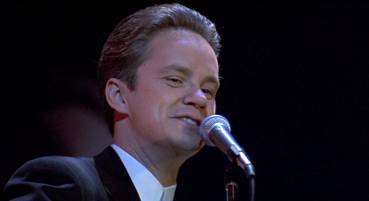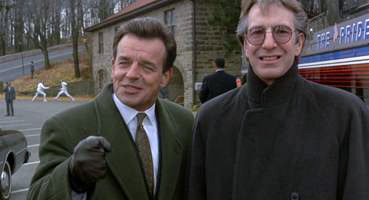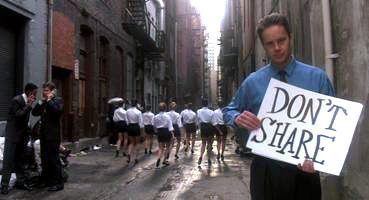"That
is what politics is really about – reality, not image." |
Senator
Brickley Paiste |
As
Bob Roberts kicks off and the main title
passes, we are informed that we are watching 'a documentary
by Terry Manchester'. Even if you come to the film with
no foreknowledge of its content, you'll soon know this is
nonsense. After all, as the title character takes the stage
it will be an uninformed filmgoer who doesn't recognise
that Roberts is actually Tim Robbins. Oh come on, he's on
the poster as well.
I'm assuming that by now all film enthusiasts are familiar with the term 'mockumentary'. A typical
example of modern lingual mutation, the films that sit under its
umbrella generally fall into one of two categories – comedies
that use the techniques of documentary to tell their story
(This is Spinal Tap, Bad News Tour,
Best in Show) and fake documentaries designed
specifically to hoodwink the audience (Ghost Watch,
Forgotten
Silver). With it's name actor cast and sometimes
non-documentary look, Bob Roberts definitely
falls into the former camp. But despite its share of comic
moments, it has more serious issues on its mind.

So
who is Bob Roberts? He's a successful reactionary folk singer
turned Republican politician and is on the campaign trail,
a ripe subject for the fictional documentary film-maker
Manchester. Initially intending the film to be both a record of
the campaign and a portrait of the man, Manchester starts
to uncover signs of a darker side of both Roberts and his
shady campaign manager Lukas Hart III, then finds himself
bearing witness what could be a dramatic turning point in
American political history.
Bob
Roberts is portrait of a political monster for
the modern age, a right-wing crusader who trades on his
entertainment background, his good looks and his squeaky-clean image,
and who feeds off and encourages the shallow prejudices
of his adoring admirers. He is charismatic, intelligent
and charming; that he is presented as such by both
Robbins the director and Robbins the actor is crucial to
the film's intent and our initial engagement with
Roberts as a screen character. But his politics are that of
prejudicial rhetoric, constructed from tabloid headline buzz-phrases
and designed specifically to play on the intolerances and
self-centred greed of his enthusiastic admirers. In the manner of many
media-trained politicians both here and in the US, he avoids
real debate in favour of sloganeering, and if directly challenged
he falls back on the charge of biased reporting without ever
confronting the issue at hand.
But
his most direct electioneering is done through his music.
Oh, the songs! Gleefully and energetically performed folk/country
crossovers, these are the film's most disturbing and effective
creations. Catchy, well produced and enthusiastically sung, they denounce
the unemployed, drug users, liberals and progressive schoolteachers
with equal starry-eyed cheer, extolling instead the virtues
of unquestioning patriotism, greed and financial investment.
Their polished arrangement and upbeat tempo jars with the
sometimes horrifying lyrics – "Be a clean-living man
with a rope in your hand!" goes a chorus-line of 'Drugs
Stink', following a cry to string even the most casual user
"up from the highest tree, without a trace of sym-pa-thy!"
At one point, watching Bob belt out a number to a crowd
of wide-eyed admirers as they whistled along, I was reminded
of the 'Tomorrow Belongs to Me' scene from Cabaret,
a genuinely terrifying sequence in which the beautiful
singing voice of a strikingly handsome member of the Hitler Youth rallies
a small crowd into a chorus of blind, patriotic hate. Perhaps
the most alarming aspect of Roberts' songs is that they are
not in themselves an exaggeration of reality – stuff like this is out
there and not too hard to find. Surely it's only a matter
of time before the Daily Mail or the like offers the soundtrack
CD free to its readers with the advice to listen carefully
to these prophetic words of widsom.

Roberts
is symbolic of a very real aspect of the New Right, the
post-80s, greed-driven conservative with contempt for everyone
with a social conscience. But he also reflects the shifting
values of a significant portion of Western society, the
communally-minded hippies of the 1960s and 70s who went
on to become mega-wealthy businessmen in the 80s and 90s.
Like many of the big corporations of today, Roberts has
no ideas of his own and is just recycling and repackaging
those of others, appropriating and then inverting the messages, songs and imagery
of the previous generation. The specific touchstones are
Woody Guthrie and particularly Bob Dylan, whose album covers
and iconography Roberts apes and whose song titles he perverts – 'The Times Are Changin' Back' is a gospel-driven call
for a return to unquestioning patriotic obedience of previous
generations. This link is emphasised by the film's repeated
structural and visual references to D.A. Pennebaker's milestone
vérité documentary record of Dylan's British
tour, Dont Look
Back, even parodying specific scenes from that
film: the misdirected backstage walk that here first exposes
Roberts' dark underside; the impromptu meeting with the
local mayor's wife and three devoted fans; the sequence
from Pennebaker's film in which Joan Baez croons as Dylan types (Roberts, of course,
is using a laptop, while singer Clarissa Flan, Roberts'
musical partner-in-crime, softly warbles a tune that dismisses
the efforts of all protestors as the product self-interest, a bit rich
coming from the Roberts camp). There is even an astonishingly
realised parody of Dont Look Back's legendary
opening sequence, in which Dylan stood in an alleyway
peeling off lyric cards to Subterranean Homesick Blues,
horribly turned around here to encourage the audience to
think only of themselves and get rich by any means possible.
The
film also reflects on the shallow nature of politics of
image, where the policies of a candidate are deemed less
important than how he looks on TV and advertising billboards.
In this respect Roberts – youthful, good-looking, smartly-dressed
and with the whitest of ever-present smiles – has far more
appeal than his socially minded opponent Brickley Paiste,
a middle-aged man who rarely looks happy and whose clothes
are functional rather than a fashion statement. This again
transcends party and even national boundaries and will have
resonance in the UK for anyone old enough remember Michael
Foot, a committed and whip-smart Labour Party leader who
was repeatedly attacked in the popular press for his unkempt
hair and his scruffy dress sense. Boy, the party image makers
must have been hugging themselves with glee when Tony Blair
first flashed that tombstone grin...
The
performances are generally on the nose, though there is
a little wobbling at the edges, reflecting the film's dual
concerns of political drama and satirical comedy. Robbins
is note-perfect as Roberts, with his boyish grins, knowing
looks at the camera and wildly enthusiastic singing only
occasionally allowed to slip to reveal the furious anger that bubbles
just beneath. As Roberts' right-hand man Chet MacGregor, Ray
Wise is a constant delight, flashing a friendly smile whenever
he realises the camera is on him and cheerfully steering
the crew away from anything he believes might show Roberts
in an even slightly negative light. Alan Rickman makes for
a thoroughly shifty Lukas Hart III, occasionally coming
across as a Doctor Strangelove-like figure who is fighting
the urge to bark out allegiance to his Führer, and
as Senator Brickley Paiste, Gore Vidal has the right note
of weariness, even if his own lack of acting experience
does intermittently show. Slightly less convincing is
Giancarlo Esposito as muckraking reporter Bugs Raplin, his
relentlessly twitchy determination coming across as just a little
exaggerated, although in the interview following his release
from jail on a framed-up charge, this very nervousness takes
on the air of a man genuinely frightened for his life
and for the future of his country. Perhaps the most cartoonish
of all are the three young Roberts devotees who follow him
on tour (one of whom is played by a young Jack Black in
his first feature role), whose wide-eyed obsession with
their hero is mugged up to sometimes comical extremes, but
which nevertheless provides the film with one of its most
chilling final images. The peppering of small roles with
famous faces can either prove a distraction or add to the
fun, depending on your viewpoint, but this IS satire, after
all. And for cineastes there is an extra layer of enjoyment to
be had from the faux-documentary technique (which includes,
at one point, engaging the cameraman in a discussion, to
which he contributes by nodding the camera in agreement)
and the various aforementioned nods to Dylan, Guthrie and
Pennebaker.

For
a directorial debut, Bob Roberts is a bold
and impressive achievement, an entertaining but biting and
ultimately disturbing political satire on the shallow nature
of image-driven politics, on the ease with which rhetoric
can usurp thoughtful debate, on recentreactionary anti-1960s attitudes, and on the fragile nature of democracy
itself. Robbins creates in Roberts a character that runs
so close to the truth at times that some have attacked the
film for suggesting that such a man could be involved in
corruption and guilty of deliberate deception – they have
no trouble with his politics, just the tainting of his public
image with scandal. There is some comfort to be taken from
the knowledge that were Terry Manchester and his documentary
for real they may have the necessary material to bring
Roberts down, and if Robbins' film prompts even a few to
think more carefully about the words that come out of their
politicians' mouths, then it too will have done its job.
At
last. After years of cropped 4:3 prints, even on specialist
film channels, we finally get the film in its correct aspect
ratio of 1.85:1, anamorphically enhanced, and looking damned
good, with sharpness, colour and contrast about right and
black levels pretty solid throughout. There is a little
grain evident in places, but it is neither distracting nor
coarse enough to look deliberate – despite the documentary
influences, there has been no attempt to give the film a
low budget vérité look.
The
Dolby 2.0 surround track is clear and exhibits some good
separation, especially in the music numbers, which are considerably
louder than the centre-set dialogue and can give you a start
if you've set your amp volume by the talk rather than the
music.
Not
a bloody thing. This is a real tragedy, as a commentary
by Robbins (check out his one for Dead
Man Walking) would have been seriously welcome.
I would certainly like to have known more about the recruitment
of so many name faces, and in particular the decision to
include what was clearly an outtake of Fred Ward as a newscaster
bumbling over his words, as well as American political references
that I no doubt I missed. But there you go.
Fine, fine film, decent transfer, no extras. Worth buying?
Well the film alone is the sell here, and on that basis
I'd have to say yes, especially at the low price it can
be found for online. An opportunity to create a more featured
edition has been seriously missed here, but it still comes
recommended for the feature, which demonstrates just how
smart and talented Mr. Robbins is, and, set against the
background of an impending invasion of Iraq, is as worryingly
relevant now as it ever was.
|